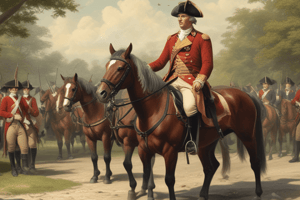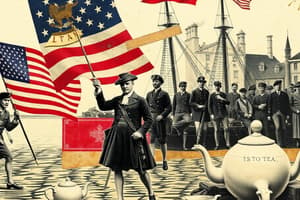Podcast
Questions and Answers
What was the purpose of the Stamp Act?
What was the purpose of the Stamp Act?
To generate revenue for King George III by taxing paper products sold in the American colonies.
Why did the colonists view the Stamp Act as unfair?
Why did the colonists view the Stamp Act as unfair?
Because they had no representatives in Parliament to voice their opinions on taxation.
How did women protest the tax on imported cloth?
How did women protest the tax on imported cloth?
They wove their own cloth at home instead of buying it from Britain.
What event is known as the Boston Massacre?
What event is known as the Boston Massacre?
What was the significance of the Boston Tea Party?
What was the significance of the Boston Tea Party?
What were the Intolerable Acts?
What were the Intolerable Acts?
What was the First Continental Congress?
What was the First Continental Congress?
What action did the colonial militias take when British troops approached Lexington and Concord?
What action did the colonial militias take when British troops approached Lexington and Concord?
What was the response of King George III to the protests and actions of the colonists?
What was the response of King George III to the protests and actions of the colonists?
What was the outcome of the militias' engagement with British troops at Lexington and Concord?
What was the outcome of the militias' engagement with British troops at Lexington and Concord?
Flashcards
Stamp Act
Stamp Act
A tax imposed by the British Parliament on all paper goods sold in the American colonies, requiring a special stamp. This tax was highly unpopular among colonists due to lack of representation in Parliament
Representation in Parliament
Representation in Parliament
The right of colonists to have elected representatives in the British Parliament, which they lacked. They couldn't vote in British elections and therefore had no voice in passing laws that affected them.
Boston Massacre
Boston Massacre
A tragic event in 1770 where British soldiers fired into an unruly crowd in Boston, killing five colonists. This heightened tensions between colonists and the British.
Boston Tea Party
Boston Tea Party
Signup and view all the flashcards
Intolerable Acts
Intolerable Acts
Signup and view all the flashcards
First Continental Congress
First Continental Congress
Signup and view all the flashcards
Patriots
Patriots
Signup and view all the flashcards
Loyalists
Loyalists
Signup and view all the flashcards
Colonial Militias
Colonial Militias
Signup and view all the flashcards
Lexington and Concord
Lexington and Concord
Signup and view all the flashcards
Study Notes
Taxes and Protests
-
In 1765, King George III needed money for Britain's empire. Parliament imposed a new tax called the Stamp Act. This required every piece of paper sold in the American colonies to have a special stamp.
-
Colonists felt the Stamp Act was unfair. They had no representatives in Parliament to speak for them, yet British citizens did. This violated their rights.
-
Colonists protested the Stamp Act, forcing its repeal. However, other taxes followed, including one on imported cloth. Women responded by weaving their own cloth.
Boston Tea Party
-
The Boston Tea Party took place in 1773, involving colonists in disguise throwing tea from British ships into Boston Harbor as protest over remaining tea taxes.
-
Events escalated with the Boston Massacre in 1770, a violent confrontation between British soldiers and colonists, resulting in the deaths of five colonists.
Revolution Begins
-
King George III punished Boston with harsh measures, including closing the port and banning town meetings. These actions, called the Intolerable Acts, angered colonists.
-
Colonists were divided on how to respond to Britain. Some wanted independence; others favored reconciliation with the king.
-
A convention of representatives from the colonies was held in 1774 (First Continental Congress), seeking peace with the king. However, there were rumors that British troops were heading to Lexington and Concord to seize weapons.
-
Armed colonial militias (volunteer groups) and British troops clashed, leading to the first armed conflict of the American Revolution.
Studying That Suits You
Use AI to generate personalized quizzes and flashcards to suit your learning preferences.



